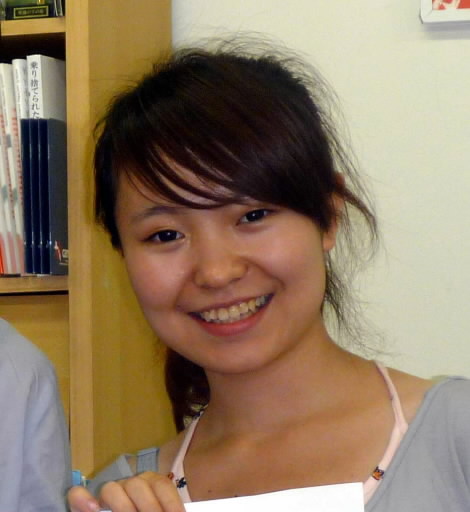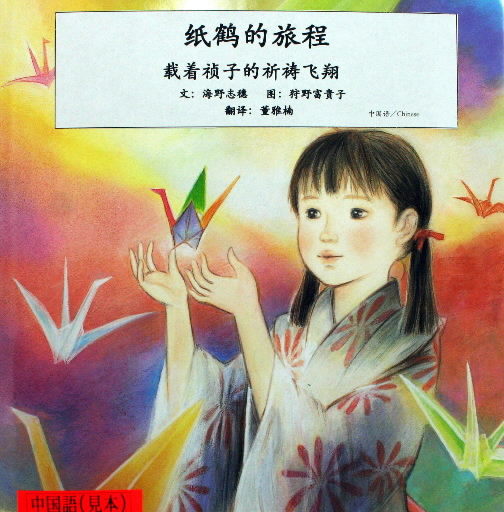Chinese student translates picture book about Sadako Sasaki into Chinese
Nov. 5, 2012
by Sakiko Masuda, Staff Writer
ANT-Hiroshima, a Hiroshima-based NPO which promotes international understanding and peace education, has translated “Paper Crane Journey,” published by the PHP Institute, into Chinese. The picture book depicts the life of Sadako Sasaki, a girl who died of radiation-induced leukemia at the age of 12, ten years after she was exposed to the atomic bomb. Dong Yanan, 22, a Chinese student studying at Tohoku University, made the translation with the hope of strengthening ties between Japan and China.
Published in 2003, the book shares the story of Sadako’s life. After falling ill, Sadako began folding paper cranes in the hospital in the hope of regaining her health, but then passed away. Moved by her death, her classmates initiated the campaign which led to the raising of the Children’s Peace Monument. Since this time, as the book explains, paper cranes have become a worldwide symbol of peace.
For two weeks this past August and September, Ms. Dong took part in an internship organized by the Hiroshima NPO Center, located in Naka Ward, Hiroshima. She was among a group of young people from the affected areas of the Great East Japan Earthquake who served as interns in Hiroshima to learn about the city’s reconstruction from the atomic bombing. During her internship at the ANT-Hiroshima office, Ms. Dong translated the book about Sadako into Chinese.
Because the book is copyrighted, publishing the translated versions has not been pursued. But the publisher has granted ANT-Hiroshima permission to affix the translated text onto the pages of the original Japanese-language book. To date, four copies of the Chinese version have been produced. If requests are made for this Chinese version, ANT-Hiroshima will provide such copies at the “at cost” price.
Ms. Dong is an exchange student from Tongji University in Shanghai. When she returns to the university next spring, she plans to donate one copy of the Japanese version and one copy of the Chinese version to the university. “I want to tell people that war, which victimizes innocent people, must never be waged,” she said. Tomoko Watanabe, 58, the executive director of ANT-Hiroshima, remarked, “The hopes for peace of young people will bridge the boundaries of political differences.”
To date, ANT-Hiroshima has translated “Paper Crane Journey” into 11 languages, including English, German, Nepalese, and Dari, a language used in Afghanistan. ANT-Hiroshima can be contacted at (082) 502-6304.
(Originally published on October 29, 2012)
ANT-Hiroshima, a Hiroshima-based NPO which promotes international understanding and peace education, has translated “Paper Crane Journey,” published by the PHP Institute, into Chinese. The picture book depicts the life of Sadako Sasaki, a girl who died of radiation-induced leukemia at the age of 12, ten years after she was exposed to the atomic bomb. Dong Yanan, 22, a Chinese student studying at Tohoku University, made the translation with the hope of strengthening ties between Japan and China.
Published in 2003, the book shares the story of Sadako’s life. After falling ill, Sadako began folding paper cranes in the hospital in the hope of regaining her health, but then passed away. Moved by her death, her classmates initiated the campaign which led to the raising of the Children’s Peace Monument. Since this time, as the book explains, paper cranes have become a worldwide symbol of peace.
For two weeks this past August and September, Ms. Dong took part in an internship organized by the Hiroshima NPO Center, located in Naka Ward, Hiroshima. She was among a group of young people from the affected areas of the Great East Japan Earthquake who served as interns in Hiroshima to learn about the city’s reconstruction from the atomic bombing. During her internship at the ANT-Hiroshima office, Ms. Dong translated the book about Sadako into Chinese.
Because the book is copyrighted, publishing the translated versions has not been pursued. But the publisher has granted ANT-Hiroshima permission to affix the translated text onto the pages of the original Japanese-language book. To date, four copies of the Chinese version have been produced. If requests are made for this Chinese version, ANT-Hiroshima will provide such copies at the “at cost” price.
Ms. Dong is an exchange student from Tongji University in Shanghai. When she returns to the university next spring, she plans to donate one copy of the Japanese version and one copy of the Chinese version to the university. “I want to tell people that war, which victimizes innocent people, must never be waged,” she said. Tomoko Watanabe, 58, the executive director of ANT-Hiroshima, remarked, “The hopes for peace of young people will bridge the boundaries of political differences.”
To date, ANT-Hiroshima has translated “Paper Crane Journey” into 11 languages, including English, German, Nepalese, and Dari, a language used in Afghanistan. ANT-Hiroshima can be contacted at (082) 502-6304.
(Originally published on October 29, 2012)








